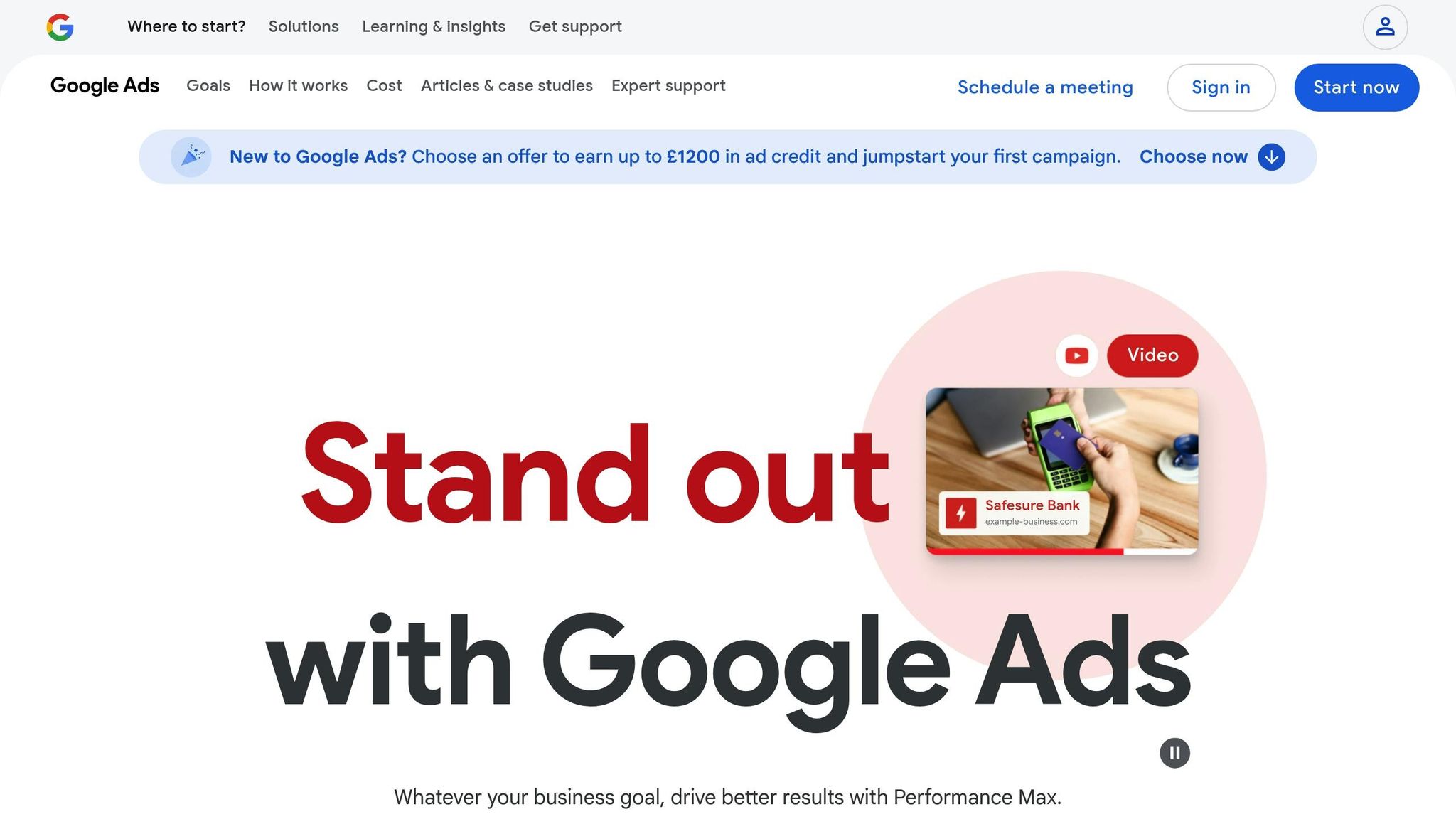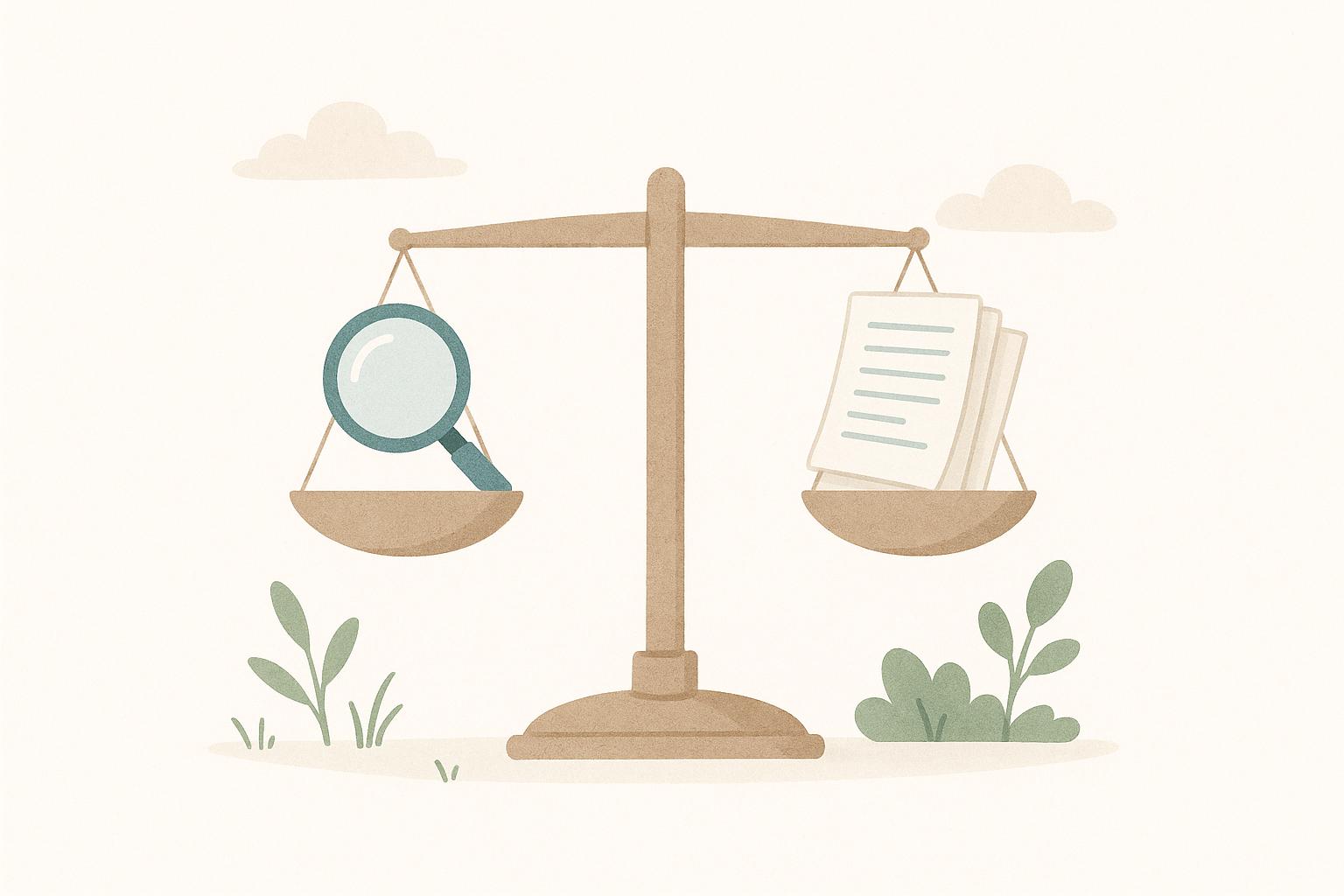Do You Need a PPC Consultant or an Agency? Here’s How to Decide
When deciding between a PPC consultant and an agency, the choice depends on your budget, campaign complexity, and business needs. Here’s a quick breakdown:
- PPC Consultant: Ideal for smaller budgets (£2,000–£25,000/month) and straightforward campaigns. Offers personalised attention and flexibility, but may lack the resources for large-scale operations.
- PPC Agency: Suited for larger budgets (£50,000+/month) and complex, multi-platform campaigns. Provides a team of specialists, broader services, and 24/7 support, but can be less flexible and more expensive.
Key Differences:
- Cost: Consultants charge £75–£200/hour or 10–20% of ad spend. Agencies often require £2,000–£15,000/month retainers.
- Communication: Consultants offer direct interaction; agencies use account managers.
- Scalability: Agencies handle larger campaigns better, while consultants excel in smaller, focused efforts.
Quick Comparison:
| Aspect | PPC Consultant | PPC Agency |
|---|---|---|
| Cost | Lower, flexible pricing | Higher, fixed retainers |
| Expertise | Individual focus | Team-based, diverse skills |
| Scalability | Limited | Built for large-scale campaigns |
| Communication | Direct, one-on-one | Managed through account teams |
| Support | May face availability issues | Continuous, team-based coverage |
Choose a consultant for smaller, focused campaigns or an agency for larger, complex strategies. Assess your budget, campaign needs, and growth plans to make the right choice.
PPC Freelancer Vs PPC Agency: Who Is Best For Your Google Ads? | Ajay Dhunna

1. PPC Consultant
A PPC consultant is an independent expert who collaborates directly with your business to manage and fine-tune your advertising campaigns. Unlike larger agencies, they usually work with a smaller number of clients, allowing for more personalised attention.
Roles and Expertise
PPC consultants oversee every aspect of your advertising strategy. This includes keyword research, campaign setup, bid management, and performance analysis. Many consultants focus on specific platforms like Google Ads or Microsoft Advertising, honing their skills in those environments.
Their expertise comes from years of hands-on experience managing a variety of campaigns. By working daily within ad platforms, they stay updated on algorithm changes, platform updates, and new features. This hands-on approach allows them to quickly identify problems, seize opportunities, and implement changes efficiently – avoiding the delays that can sometimes occur in larger organisations.
Consultants often prioritise strategic planning over simple task execution. They take time to assess your business model, understand your customer journey, and align your PPC strategy with broader marketing objectives. This approach ensures campaigns are not just effective but also aligned with your overall goals, which is reflected in their pricing.
Cost and Pricing Models
Their expertise is offered through various pricing structures:
- Hourly rates: Consultants typically charge between £75 and £200 per hour, depending on their experience and niche expertise.
- Monthly retainers: These range from £1,500 to £5,000, depending on the complexity and scope of the campaigns.
- Percentage of ad spend: Some consultants charge 10% to 20% of your monthly ad budget.
- Project-based pricing: For one-off tasks like account audits or campaign setups, fees range from £500 to £3,000, depending on the work involved.
For smaller businesses, consultants often prove to be a cost-effective option. For instance, managing a £5,000 monthly ad spend might cost £750 to £1,000 in fees, whereas agencies often have minimum fees of £2,000 to £3,000 per month, regardless of your ad spend.
Scalability and Support
The scalability of a PPC consultant largely depends on their capacity and your business’s growth. They are typically well-suited to handle campaigns with monthly budgets between £2,000 and £25,000. However, managing larger or more intricate operations may stretch their resources.
One of the key advantages of working with a consultant is direct communication. You won’t have to deal with layers of account managers or support teams – queries are often answered quickly. That said, consultants are individuals, so their availability can be limited during holidays, illness, or personal emergencies, potentially causing temporary gaps in campaign management.
Consultants are highly adaptable, making them excellent for businesses with time-sensitive promotions or those in fast-paced industries. However, their resource limitations can present challenges. They may not provide 24/7 monitoring, lack expertise in emerging platforms, or have access to premium tools often used by larger agencies. Additionally, they might struggle with managing campaigns across multiple time zones or delivering extensive creative assets.
Despite these limitations, their agility and ability to adjust quickly to business changes can ensure your campaigns remain aligned with evolving goals and market conditions.
2. PPC Agency
A PPC agency brings together a team of professionals to manage your advertising campaigns. Unlike working with an individual consultant, agencies offer a full suite of resources, including strategists, analysts, creative teams, and account managers, all collaborating to optimise your campaigns.
Roles and Expertise
PPC agencies are equipped with diverse expertise to enhance your advertising efforts. Their teams often include campaign strategists, data analysts, platform specialists, creative designers, and copywriters. This allows them to handle complex, multi-platform campaigns while also creating assets like videos, display banners, and landing pages.
Many agencies go beyond basic campaign management by specialising in specific industries or campaign types, such as e-commerce, lead generation, or B2B marketing. This focus enables them to leverage proven strategies and benchmarks from similar businesses, which could give your campaigns a performance edge. For businesses looking to scale their PPC efforts, agencies can craft tailored solutions to meet those needs.
That said, working with an agency often means communicating through an account manager rather than directly with the specialists. While this structure ensures streamlined communication, it can occasionally lead to slower decision-making or misaligned campaign objectives. These extensive resources and expertise are reflected in the pricing models agencies use.
Cost and Pricing Models
Agencies typically offer several pricing structures:
- Monthly retainers: £2,000 to £15,000, depending on the complexity of the campaign and level of service.
- Percentage of ad spend: Usually 8% to 15% of your monthly advertising budget.
- Setup fees: Initial campaign setup costs range from £1,000 to £5,000.
- Minimum contracts: Often require a commitment of 3 to 12 months, with fixed monthly fees.
For businesses with larger advertising budgets, agencies can provide better value. For example, managing a £30,000 monthly ad spend might cost £3,000 to £4,500 in agency fees. These fees often include additional services like landing page optimisation, conversion tracking setup, creative development, and detailed reporting dashboards – services that might come at an extra cost with a consultant.
However, agencies may not always offer the same level of customisation as individual consultants. Their bundled services and established processes can sometimes limit flexibility, especially when it comes to experimenting with unconventional strategies.
Scalability and Support
Agencies are built to handle large-scale operations and adapt to rapid growth. They excel at managing campaigns with monthly budgets exceeding £50,000 while maintaining consistent performance. Their team-based approach ensures seamless coverage – if one team member is unavailable, another can step in without interrupting campaign management.
Most agencies also offer 24/7 monitoring, which is particularly useful for businesses operating across multiple time zones or running time-sensitive campaigns. They can quickly adjust budgets, launch new product lines, or expand into new markets without being constrained by resources.
Another advantage is their detailed reporting. Monthly reports typically include key performance metrics, competitive analysis, and actionable recommendations. These insights help businesses not only track campaign performance but also understand the reasons behind trends and identify new opportunities.
Despite these strengths, agencies do have limitations. Their approval processes can slow down changes, and they may be less inclined to test unconventional approaches that fall outside their standard methodologies. Additionally, smaller accounts might not receive as much attention, particularly if the agency prioritises larger clients, which could affect the level of personalised service.
sbb-itb-dcae4ad
Pros and Cons
When weighing up the roles, costs, and support models discussed earlier, it’s also worth considering the specific advantages and drawbacks of hiring a PPC consultant versus working with an agency. Here’s a quick comparison to help you decide what suits your business best:
| Aspect | PPC Consultant | PPC Agency |
|---|---|---|
| Expertise | Offers focused, specialised knowledge with direct access to an experienced professional | Provides a team with diverse skills, drawing on proven strategies across various disciplines |
| Cost | Lower overheads, often with flexible day rates and no binding contracts | Operates on fixed monthly retainers, offering a full-service package |
| Communication | Direct, one-on-one interaction | Managed through account teams, often with multiple points of contact |
| Scalability | Best suited for smaller budgets or simpler campaigns | Designed to handle larger budgets and more complex campaigns |
| Support | Personalised attention but may have gaps in availability | Continuous support ensured by team redundancy |
| Flexibility | More open to experimenting with unconventional or tailored strategies | Operates within structured processes, which can sometimes limit customisation |
| Resources | Relies on individual expertise and may outsource for creative or technical tasks | Offers comprehensive resources, including creative design, landing page optimisation, and detailed reporting |
These distinctions highlight the key factors that could influence your decision, depending on your business needs.
Budget considerations play a central role. If your advertising spend is modest, a consultant’s flexible pricing can provide excellent value while still delivering focused, dedicated service. On the other hand, agencies tend to justify their retainer fees by managing larger, multi-platform campaigns with integrated strategies.
Campaign complexity is another deciding factor. Agencies excel at handling intricate, multi-platform campaigns, leveraging their collective expertise to provide insights across multiple channels. This is especially useful for businesses operating in diverse markets or those requiring detailed attribution models.
Availability and continuity are important, too. A consultant might occasionally face capacity issues or interruptions, whereas agencies typically ensure uninterrupted service through team-based redundancy. This means your campaign won’t suffer delays due to individual availability.
Speed of implementation can vary. Consultants often make decisions and implement changes quickly, which is ideal if you need rapid adjustments. Agencies, however, might require internal approvals, which could slow down the process – but this approach often ensures a more thorough review.
Industry expertise can also differ. Some consultants specialise deeply in specific niches, such as e-commerce or B2B lead generation, offering insights that rival niche agencies. Meanwhile, agencies bring a broader perspective, using their experience across various sectors to refine campaign strategies.
Lastly, contract terms can influence your flexibility. Consultants often work on month-to-month agreements, giving you the freedom to adjust or pause services if needed. Agencies, by contrast, typically require longer-term commitments, which might offer stability but limit your ability to pivot quickly if results fall short of expectations.
Conclusion
Deciding between a PPC consultant and an agency boils down to your business size, budget, and the complexity of your advertising campaigns. Below, we break down the key differences to help you choose the right fit for your current and future needs.
A PPC consultant is a great choice for small to medium-sized businesses with modest ad budgets. Consultants are particularly effective for straightforward campaigns or when you need quick decisions without navigating layers of approval. Their direct communication style and flexible month-to-month agreements make them ideal for businesses experimenting with new markets or running seasonal campaigns.
On the other hand, a PPC agency is better suited for businesses with larger budgets or those managing intricate, multi-platform campaigns. Agencies bring a full suite of services under one roof, covering everything from creative design to landing page optimisation. This makes them an excellent option for handling more complex advertising strategies.
In short, consultants offer flexibility and personal attention for smaller budgets and simpler needs, while agencies provide comprehensive services and scalability for larger, more demanding campaigns.
Think about your growth plans: consultants are perfect for steady, incremental growth, while agencies are equipped to handle rapid scaling. And remember, your choice isn’t set in stone. Many businesses start with a consultant and transition to an agency as they grow – or scale back to a consultant during restructuring phases. The most important factor is aligning your current needs with the expertise and support that will best help you achieve your goals.
FAQs
How can I decide whether to hire a PPC consultant or an agency?
Choosing between a PPC consultant and an agency comes down to the size and complexity of your advertising goals. If you’re running a smaller campaign with clear objectives and only a few channels to manage, a consultant might be the right fit. They can often deliver the expertise you need at a lower cost.
However, if your campaigns are more extensive – covering multiple platforms, requiring in-depth analytics, or needing continuous optimisation and strategic oversight – an agency could be the better option. Agencies typically have access to larger teams and broader resources to handle these demands.
Think about what your campaign requires. Do you need detailed keyword research, bid management, or performance tracking? Is your budget large enough to justify the additional support an agency provides? Matching your choice to your specific goals and resources will help you get the most out of your advertising spend.
What are the risks of hiring a PPC consultant instead of an agency, particularly around availability and support?
When choosing a PPC consultant instead of an agency, there are some potential challenges to keep in mind, particularly around availability and support. Since consultants often work solo or in small teams, their ability to address urgent issues or respond quickly might be limited. This could mean delays during high-pressure campaign periods.
Another factor to consider is the range of resources and expertise. Larger agencies often have access to diverse tools and specialists, which can be crucial for scaling campaigns or tackling more complex advertising goals. Consultants, on the other hand, may not always provide the same level of strategic depth or support in these areas. Make sure to weigh your business needs carefully before making a decision.
How can a business smoothly transition from a PPC consultant to an agency as it grows?
Transitioning from working with a PPC consultant to partnering with an agency as your business grows takes thoughtful planning and a clear vision. Start by assessing your current PPC campaigns, pinpointing areas where you might need extra support or specialised expertise. Make sure your growth goals align with what an agency can deliver.
When you’re ready to make the move, focus on open and effective communication between your consultant and the new agency. Share all essential details, including account history, performance metrics, and campaign specifics. This ensures continuity and minimises the risk of disruptions to your advertising efforts.
As you select an agency, prioritise one that can meet your expanding needs. Look for a team with the right tools, strategic know-how, and a proven history of achieving results for businesses similar to yours. With proper planning and close collaboration, you can make the transition seamless and set the stage for continued growth.

